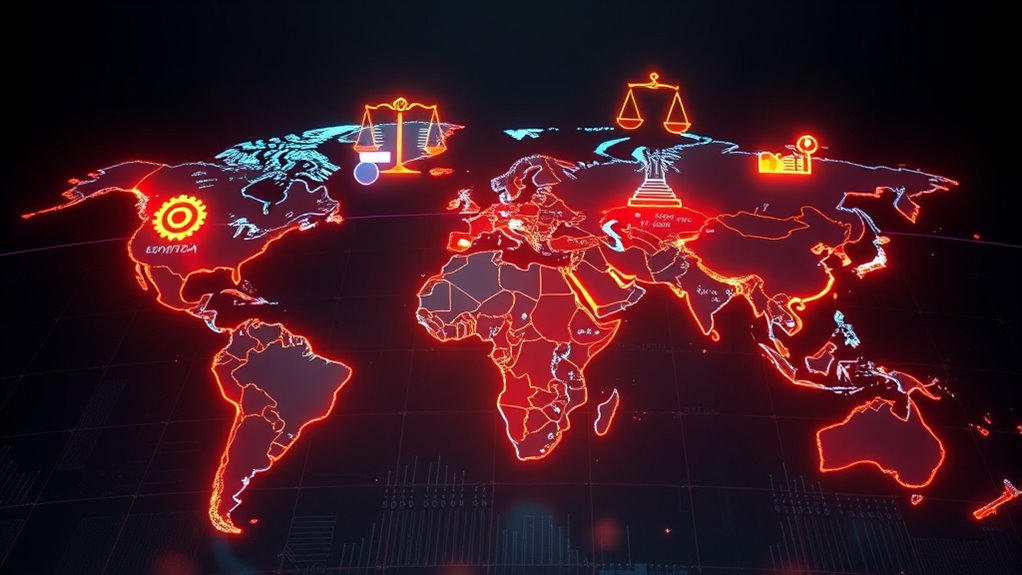Around the world, governments are crafting AI regulations to balance innovation with ethics and privacy. Many countries focus on transparency, accountability, and safeguarding personal data, but approaches vary widely. Some prioritize economic growth with relaxed rules, while others enforce stricter controls. International cooperation is still evolving, making the regulatory landscape complex. To understand how these efforts impact you and society, keep exploring how these policies are shaping the future of AI everywhere.
Key Takeaways
- Countries have diverse AI regulations, with some emphasizing innovation and others prioritizing privacy and safety.
- The EU’s GDPR enforces strict data privacy rules, influencing global AI data handling standards.
- International coordination faces challenges due to differing national policies and priorities.
- Ethical principles like transparency and accountability are central to many national AI regulatory frameworks.
- AI regulation is an evolving landscape, requiring ongoing updates to address technological advancements and societal needs.

Have you ever wondered how countries are shaping the future of artificial intelligence? It’s a question that’s gaining urgency as AI becomes more integrated into daily life. Governments around the world are racing to develop regulations that strike a balance between innovation and safety. One of the key areas they’re focusing on is AI ethics, which guides how AI systems should behave responsibly and fairly. Ethical considerations aren’t just about avoiding harm; they also involve ensuring transparency, accountability, and fairness in AI decision-making. Countries recognize that without clear ethical frameworks, AI could perpetuate biases or make decisions that undermine trust. That’s why many nations are establishing guidelines and principles that emphasize human oversight and the importance of aligning AI development with societal values.
Alongside AI ethics, data privacy is a cornerstone of regulation efforts. As AI systems process vast amounts of personal data, protecting individuals’ privacy becomes critical. Countries are implementing laws that restrict how data can be collected, stored, and used. For instance, the European Union’s General Data Protection Regulation (GDPR) sets strict rules to safeguard personal information, giving users greater control over their data. Similar laws are emerging elsewhere, aiming to prevent misuse and unauthorized access. These regulations often require organizations to be transparent about their data practices, obtain explicit consent, and implement robust security measures. By doing so, governments aim to build public trust in AI systems, ensuring that technological progress doesn’t come at the expense of personal rights. Additionally, understanding wicks and their role in candle making exemplifies how detailed standards are essential for safety and quality, similar to how AI regulations aim to ensure responsible development.
However, regulating AI isn’t straightforward. Different countries have varying priorities and approaches, leading to a patchwork of policies that can sometimes clash or overlap. Some nations emphasize innovation and economic growth, easing restrictions to attract tech companies. Others prioritize privacy and safety, imposing stricter controls. International organizations are attempting to coordinate efforts, but disparities remain. As you look at these regulatory landscapes, it’s clear that AI ethics and data privacy are central to shaping responsible development. Countries that prioritize these principles can foster innovation while maintaining public confidence. Conversely, neglecting them risks public backlash, misuse, and unintended consequences.
In the end, the world is still figuring out how to regulate AI effectively. What’s certain is that these discussions will continue to evolve as technology advances. For you, understanding these regulatory trends means recognizing the importance of responsible AI development—one that respects ethics and protects privacy. It’s a complex balancing act, but one that’s essential to ensuring AI benefits society without compromising fundamental rights. As nations refine their policies, your role as a user and citizen becomes even more critical in advocating for transparent, ethical AI practices that prioritize your privacy and well-being.
Frequently Asked Questions
How Do Different Countries Define AI Regulation Scope?
You’ll find that different countries define AI regulation scope based on their unique ethics frameworks and transparency requirements. Some nations focus on ensuring AI systems are safe and fair, emphasizing ethical principles, while others prioritize transparency, mandating clear disclosures and accountability. These varying definitions shape policies, with some setting strict limits and others adopting more flexible approaches, reflecting each country’s values and technological priorities.
What Penalties Exist for Non-Compliance With AI Laws?
Did you know that over 60% of countries with AI laws have implemented specific penalty frameworks? If you don’t comply, enforcement mechanisms can lead to hefty fines, operational bans, or even criminal charges. These penalties aim to enforce accountability, ensuring responsible AI use. You must stay informed about your country’s enforcement mechanisms, as non-compliance could profoundly impact your reputation and financial stability.
Are There International Standards for AI Safety and Ethics?
You’ll find that international standards for AI safety and ethics are still evolving, but cross-border collaboration plays a vital role in shaping them. Many organizations and countries work together to develop ethical frameworks that promote responsible AI use globally. While these standards aren’t yet universally binding, they aim to guarantee AI systems are safe, fair, and transparent across borders, encouraging organizations to adopt best practices and uphold shared ethical principles.
How Do Regulations Impact AI Innovation and Startups?
Regulations can feel like a double-edged sword; they may slow down innovation but also set clear standards that boost market competitiveness. As a startup, you might find funding opportunities limited if compliance costs are high, yet transparent rules can attract investors seeking safer, ethical AI solutions. While steering through regulations is challenging, embracing them can ultimately foster trust and open doors to new markets, helping your AI venture thrive.
What Role Do Public Consultations Play in Shaping Policies?
Public consultations play a vital role in shaping AI policies by giving you and other stakeholders a voice. Your public input helps policymakers understand real-world concerns and potential impacts, ensuring that policies are balanced and effective. Through active engagement, you provide valuable policy feedback that influences regulations, making them more transparent and inclusive. This collaborative process ultimately leads to smarter AI governance, fostering innovation while addressing safety and ethical considerations.
Conclusion
You see, as AI regulation evolves worldwide, you must stay informed, stay vigilant, and stay adaptable. Countries develop policies, industries create standards, and societies raise questions. Together, these efforts shape a future where AI is responsible, ethical, and beneficial. By understanding the global landscape, you can better navigate the challenges, seize the opportunities, and contribute to a balanced, innovative, and safe AI-driven world. Stay engaged, stay proactive, and stay committed.









